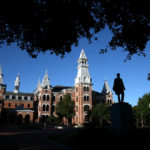Posted: 10/3/03
LifeWay Explore the Bible Series for Oct. 12
Praying and caring lead to rich relationships
![]() Philippians 4
Philippians 4
By John Duncan
Lakeside Baptist Church, Granbury
Frederick Buechner once described his conversion to Christ as “a crazy, holy grace.” The French scientist and mathematician Blaise Pascal spoke of God filling the empty space in his life, “There is a God-shaped vacuum that only God can fill.” C.S. Lewis, a reluctant convert to Christ, announced his life was “surprised by joy.” Buechner, Pascal and Lewis all describe one common feature of the Christian life–joy.
Faces
Paul never loses sight of the faces of his friends at Philippi. Likewise, he never wavers from remembering the face of Christ. He names his friends in Philippians 4: Euodia, Syntyche, Clement and the saints, especially those of Caesar's household. He urges believers to stand strong in the Lord (v. 1). Paul's joy finds meaning in the unity and harmony of Christ. Joy flows from Christ into the hearts of his servants. Joy blossoms and multiplies in mutual service to the honor of Christ. Spiritual concord comes in maintaining two relationships: (1) Christ; and (2) other believers in the Lord's church.
 |
The face at prayer
When Paul recalls the faces of his friends and the importance of their unified relationship in Christ, he prays. P.T. Forsyth identifies one key element of prayer, “Prayer is an act, indeed, the act of fellowship.” Prayer unites the church in fellowship, a common sharing in purpose and life of the joy of Christ. Time calls for prayer. The urgency of time and the nearness of Christ's coming motivate the Christian's prayer life (v. 5).
Paul yearns for the face to turn to God in prayer. Stop worrying (v. 6). Anxiety stifles the spirit of prayer. Daily devote your life to God in prayer and make specific requests to God in prayer.
John Calvin says in prayer “we unload into the bosom of God everything that harasses us.” Trust God through prayer. He hears. He knows. He sees. Give thanks. Where God's grace overflows in a spirit of joy, his people overflow with a spirit of gratitude.
Paul does not speak of sweeping generalizations (Thank you, Lord). Rather, he speaks of specific words lifted up in grace to God (Thank you Lord for the car, for food on the table, for clothes, for a roof over my head, for the salvation of my child or grandchild).
The face at prayer touches the heart at peace. Peace beyond human comprehension transforms not the heart of God but the heart of the one praying. God's peace guards the heart and mind like a soldier standing his post to protect from the lurking enemy (v. 7).
God's peace possesses honorable qualities (v. 8). God's peace leads us by the hand to places and dreams of Christ-honoring excellence and puts on our lips words of praise to God. The mind must meditate on the things of God. Prayer produces lovely Christ-like thoughts and heavenly peace in the soul.
From prayer to care
Paul remembers not only faces, but acts of concern generated toward his needs (v. 10). Paul joyfully and thankfully recalls their kind acts. He reflects on joy's ability to live beyond mere circumstances (vv. 11-12). Paul knew both how to live in the lap of luxury (v. 12 and v. 18) with ample supply for living and how to live in the pressures of poverty (v. 12). Paul knew the reality of eating choice meat at the king's table with a bloated stomach and the harshness of the gnawing, growling, grinding of acidic juices churning in the belly because of hunger.
In need supplied and in need unfulfilled, Paul's secret to contentment was joy supplied daily in relationship with Jesus. Vincent acknowledges “Paul did not deny the want itself, but the want as the motive and measure of his joy.”
Fred Craddock says, “He (Paul) is defined neither by wealth or poverty but by a contentment that transcends both and by a power in Christ which enables him to live in any circumstance.”
From care to power
Paul knows his ability to serve Christ, to minister in the church, to preach the gospel in the community, to fellowship with friends and to live in hardship or prosperity comes because daily Christ pours his power into Paul (v. 13). To paraphrase the poet John Donne's words, “No Christian is an island.” Christ's servants trust in his power through prayer, joyful surrender and with confidence that God uses people to minister to the needs of others.
A.T Robertson summarizes verse 13: “Cooperation is still the great demand among modern Christians. Churches so often leave it all for the pastor to do.” Mutual service in the realm of cooperation aims for cooperation with God in his will that encourages the cooperation of Christian servants.
God's power in reflection
Paul remembers his friends in their act of kindness when they gave a gift (of money) to support the ministry to which God called him (vv. 14-23). The gift was a sacrificial, sweet-smelling gift received with grace (v. 18). The gift received was ultimately a gift to God (Gordon Fee). As always, God supplies needs for his glory (v. 19).
Question for discussion
![]() Recalling the faces of which friends bring you joy?
Recalling the faces of which friends bring you joy?













We seek to connect God’s story and God’s people around the world. To learn more about God’s story, click here.
Send comments and feedback to Eric Black, our editor. For comments to be published, please specify “letter to the editor.” Maximum length for publication is 300 words.